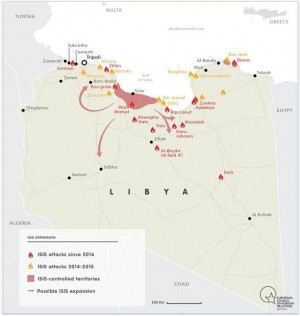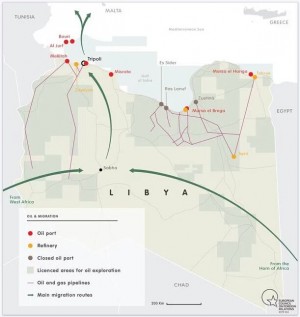By Sami Zaptia.

London, 12 May 2016:
In setting the scene for a discussion on ‘’How to escalate political efforts to stabilise Libya?’’ . . .[restrict]at the European Council on Foreign Relations (ECFR) in London today, Mattia Toaldo, Senior Policy Fellow said that the Government of National Accord (GNA), led by Faiez Serraj, was not moving much outside its secured headquarters, the Abu Sitta Naval Base.
The discussion hosted Crispin Blunt, Conservative MP and Chair of the House of Commons Foreign Affairs Committee.
Libya and the IS problem is important for Europe because the Libyan coast is 200 nautical miles from Europe. The support of the GNA and the fight against IS seem to be on a collision course, he noted. There are US, British and French Special Forces in Libya supporting the effort against IS. This is undermining reconciliation efforts, he added.
The real emergency in Libya is the economic situation. Yesterday, he noted, there were 2 hours of electricity in Tripoli. Libya’s deficit ratio is 54 percent of GDP. Foreign currency reserves could be exhausted by 2018 and 85 percent of the country’s workforce are paid by the state, he explained.

The important question should be how to unify the opposing Libyan factions. The EU should suggest to the GNA that it offers maximum autonomy, or what is referred to in the UK as ‘’devo-max’’ (maximum devolution), to the east, as a possible policy solution.
The Senior Policy Fellow also said that regional interference in Libya needs to be curtailed when it comes to arms sales and oil trade outside UN resolutions. Europe needs to embark on a diplomatic offensive in support of the political process – and not escalate the armed conflict.
The fight against IS is now being used by the opposing factions to strengthen themselves. The anti-IS offensive needs a joint command, he added.
On the issue of migration ‘‘Operation Sofia’’, enabling the EU to enter Libyan territorial waters to pick up illegal migrants and return them to Libya, is wrong. Europe would not allow another country to enter and operate in its territorial waters, he noted.
On implementing DDR of the militias, and the formation of a unified Libyan army, Toaldo said that building an army takes 10-15 years; asking what happens in the meanwhile? Militias are ok in the short term he suggested, as long as there is civilian oversight in the meanwhile. He felt both policies of building an army and working with militias could operate side by side. [/restrict]







